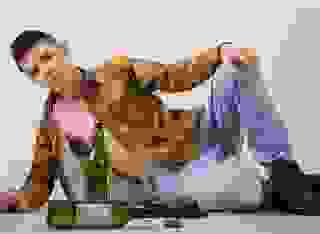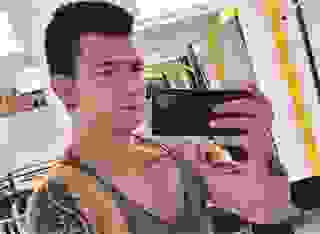- Gay Male
- The Heart is a Poor Judge Ch. 09
Note: You can change font size, font face, and turn on dark mode by clicking the "A" icon tab in the Story Info Box.
You can temporarily switch back to a Classic Literotica® experience during our ongoing public Beta testing. Please consider leaving feedback on issues you experience or suggest improvements.
Click hereAlong its godlike arc through the sky, the moon trembled. Instead of tracing a time-honored path across the stars, its trajectory in the moments that followed would be brand new. He felt it in his heart. Perhaps the moon would move backward in the direction it came from, or straight downward to the flat horizon. ...Or toward him--somehow that seemed most likely. If the moon landed in the ocean nearby, how big of a splash would it make? (He had not yet learned the true scale of celestial bodies.) Would the resulting wave cause the boat to overturn, spilling ninety sleeping souls into the agitated water to drown?
Over several minutes spanning midnight, he watched the foreign, shimmering vibrations of that perfect white orb. A hopeful energy grew inside him until the possibility of nothing happening became unthinkable. He waited.
His last memory before sleep was of grasping in desperation for the moon to finally alter its course, but either it never did, or he missed it doing so, as he could no longer pry his weary eyes open to keep watch. In his next memory, he awoke from a far away slumber to the stars disappearing and the sky changing from black to the deepest blue of predawn. The moon was nowhere to be found.
He sat up--a respite from the snoring man whose elbow had pressed into his side for hours. He had slept wedged between the man and where the bottom of the boat sloped steeply upward, partway sheltered by a broad wooden rail. Heaving himself to a seated position on the edge, he scanned the sleeping bodies below him, packed together like dead fish. The vessel rocked, but only gently, so he stayed perched there for some time with no worry of being thrown out.
Someone else was awake. She sat up close to the bow. She was a person whom he might have called a girl, or a woman, but neither with confidence. This person turned slightly to the side, wincing, hair blowing gently off her shoulders and he noticed that she was beautiful. He also saw there was a baby growing inside her stomach. She leaned over the greased wood rail of the boat and vomited in the calm water.
It drifted by him as the boat ambled forward. He did not look at it. She turned to look at him. She seemed to look straight into his eyes, but it was still too dark to tell. He looked straight into hers. Eventually, she became disinterested in him and looked back out at the water. Or maybe she had not noticed him at all.
A trawling motor vibrated through the tung-oiled planks supporting him. Its throttle position was set in interest of economy rather than speed; the rationed supply of gasoline would be enough if they took their time and did not fight the water. He knew all this because yesterday (the first day) he had asked the person driving the boat about it. He had received begrudging answers to what seemed like perfectly sensible questions, and not without finally being scolded for his intrusiveness.
Two men had been tasked with driving the boat. He had not spoken to the other man before, but guessed he was currently at the helm since the first driver had guided the boat all day and into the evening.
He looked toward the small compartment and saw through a sheet of dirty plexiglass the grim and tired expression of the second driver. Scooting carefully along the rail, he inched back toward the compartment while avoiding several other sleepers. A gap emerged between bodies along which carefully placed steps landed him at the narrow entrance to the wooden box housing the driver.
The back of the driver's pale blue shirt was stained broadly by a smear of black grease. His (surely sore) buttocks rested atop a worn wooden stool fastened with rusting brackets to the floor. He swayed back and forth counter to the mild motions of the boat. The boy hesitated. He had not expected three others to be sharing the cramped compartment with the driver. They lined the floor at his feet; on one side lay a mother and her small child. On the opposite slept the other driver. He didn't want to disturb anyone's rest, but his curiosity won out.
"How long until Malaysia?"
The driver was startled, and not happy about it. "Go away." He hadn't bother to turn around.
"I need to know how long."
"Four days."
"How do you know?"
"I navigate."
"How much experience do you have?"
The man turned his head to the side, still not looking at him. "More than you have. Now go away."
He picked his way carefully back out to the edge of the boat. A few other people had risen from sleep. A child half his age began to cry.
In every direction, as far as he could see, there was only water. On the first day, the fading immensity of a mountain was still visible, but now he saw nothing--only clear air and flat sea all the way around in a seamless horizon. The breeze thickened with the scent of rotten algae. The hopeful white gulls which had stuck close to the boat on the first day, constantly circling and perching, were now all gone. Any food items were too precious to be left unguarded, so the scavenging birds had finally given up and headed back toward land.
The rising of just a few people here and there set off a chain reaction so that within five minutes, half the boat was standing shakily, moaning with lingering fatigue, stretching out their bone-deep soreness. It took little time for the commotion to rouse nearly everyone. A briefly silent morning turned noisy.
Less than an hour later the sun had risen just over the horizon. Already, it shone with a threatening brilliance that made everyone who faced it shield their face involuntarily. There was nothing in the sky competing against it, so it dominated. The sickening heat it generated was sure to return by midday.
But midday was still far away. A row of four decrepit gas burners assembled at the base of the wall to the driver's compartment. The space required to cook displaced some families, whose outward movement drove those already near the edge closer to it.
Just as the boy had before dawn, a few agile young passengers began perching on the outer rail. One young man lost his balance and felt backward into the water. Mercifully, the driver bothered to cut power to the engine while the teen was heaved, soaking wet, back into the boat.
A meal of wet rice and small hunks of fish was served a short time later. The boy and several other people who did not possess bowls had to wait until the mixture cooled enough to be poured directly into their cupped hands. One of the people who waited was the pregnant girl (or woman--it was still somehow unclear), but once the person holding the tin ladle noticed her condition, she was given one of the cooks' bowls and served a generous portion.
They sat down next to each other, propped against the aft wall of the compartment, and to the boy's surprise, she spoke to him.
"Are you alone?"
He only nodded. He felt shame for eating from his hands in front of her, but several others around them did the same.
"Me too," she said.
The boy swallowed his first mouthful. It tasted bland, but reminded him immediately of his hunger and he felt ravenous. "Are you going to have a baby?" he asked her.
She nodded. "If we make it to Malaysia, maybe I will have it there."
The boy didn't like that she had used the word 'if'. "I know we will make it there."
She ate very slowly and the boy wondered if she would vomit again after the meal. She said, "I heard we don't have enough fuel to make it all the way."
This shocked him. His expression must have given it away, because she quickly said, "That might not be true. It was just something a person next to me said. Besides, there are many ships along this route. Sometimes they take people on board."
"They do?" He tried not to look hopeful. Privately, he admonished himself for having let his feelings show at all.
"Yes," she said simply. She looked up at the sky. "God willing."
He finished what clung to his hands by licking them clean. Then he waited for what felt like an appropriate amount of time to pass before asking his next question. "Are you grown up?"
"Yes," she said slowly. "Look, I am pregnant."
"I know," said the boy. "I see."
She looked at him in a strange way. "All the others your age are not alone."
The boy looked down. "No one here is my age."
She pointed toward the back of the boat. "That boy over there must be twelve, and he is with his father."
"I am ten," said the boy. And then he started to cry. There had been no warning, no time to get away or even to feel ashamed. He hardly detected the underlying sadness which had provoked it. It was a cold and uncontrollable outflowing of grief which finished as quickly as it began. She put her arm around him and pulled him close. The act perfectly replicated what his own mother would have done, and it shocked him to remember that just two days earlier, he was still with her. Already she felt separated from him by many worlds.
;-;
The rest of the day crawled by, never quite feeling like real life, owing to the substantial constraints of his new experience. He noted where both fresh water and food supplies were kept, guarded at all times by a rotation of volunteer gatekeepers. As he roamed opportunistically around the cramped vessel through gaps among the throng which were constantly opening and closing, he listened to every word he could discern. He heard many worries and fears expressed in doubtful tones. But he also witnessed more than a few expressions of joy from those who dared speak excitedly of a future completely unknown...or gratefully for their improbable escape from a fate otherwise certain.
As he watched strangers share amongst each other what little personal provisions they had brought on board, laughing and commiserating and making new friendships, he hoped that those assigned to guard the food and water supply participated only as a token measure. He wanted to believe their services would not be needed here, among good people.
All the while--constantly, in fact, since he had first noticed her--he was aware of the location and the movements of the young pregnant woman. His concern over her culminated at the hottest part of the day, when he resurfaced from a delirium, panicked, unable to spot her. He looked frantically aft in time to witness her being led by a young mother into the driving compartment to shelter from the sun. It pleased him very much to see this.
The afternoon heat drained all but the most able-bodied of their energy. Nearly everyone grew quiet and exhausted. Even the boy, who had never in his life experienced an aversion to the sun, became first resentful of it, then afraid of it as he panted through the worst moments, snugged in his spot halfway beneath the rail. Finally it began to let up in the early-evening, in time for a second meal (more of the same) to begin preparations.
The portions were smaller than in the morning. There had been talk that if they continued rationing based on the size of the first meals, they would not have enough to last the remaining days to Malaysia. Some argued they could always fish for more, but others countered that it was a dangerous assumption; there was no guarantee of catching anything in these waters.
Hot slurry of rice and fish directly in hand, he found the young woman and sat next to her again. It was the first time they had spoken to each other since the previous meal. Again, she had been lent a bowl to use. She looked unwell and not very hungry, but she began to eat anyway.
"Are you okay?" she asked him.
He was surprised to be asked such a question, especially from a person in her condition. He did not have an answer ready.
"Don't worry," she said, swallowing with some effort (embarrassingly, he had already finished his), "we don't have to talk."
"Who is the father?"
She straightened and her eyes widened for a second.
"I'm sorry," he stammered, all at once aware of his rude abruptness.
"It's okay," she said. "The father is someone who is not suitable. I would rather not talk about him."
He was so embarrassed for having asked that he momentarily could not bring himself to speak.
"Are you still hungry?" she asked him. "I should eat this, I know. But I don't feel hungry and I may get sick later."
Of course he was still hungry, but not for a second would he consider accepting the half-finished bowl now thrust toward him. "I can't take it," he said. "Please understand."
She drew the bowl back toward her chest.
"And I think you should try and finish. Even if you throw up again, it will still help you."
She smiled at him in a distant way. "Okay," she said. "If you're sure."
"I am," he told her, maintaining a level of seriousness that he imagined to be very adult.
She kept regarding him with that faint, puzzling smile. "Will you tell me if you are ever feeling lonely?"
"I will," he confirmed. But the truth was that he couldn't tell what he was feeling.
"Do you have a plan for when we arrive in Malaysia?"
"Yes," he said eagerly. "My father tells me to inform the officials of my status as an unaccompanied minor--and I have papers," he said, excitedly reaching for his pocket but then remembering he was not to show them to anyone but people with official titles and badges. "Well, they're safe in here, anyway."
She nodded. "It will be good if we get placement in the refugee camp."
"Yes, very good," he agreed. "I am very much hoping for that."
She never stopped smiling at the things he told her. It made him self-conscious, but only scarcely--most of all he was pleased that his company seemed to bring her joy.
;-;
As the second night closed in, the moon emerged again. As all of its magic fell away, the boy nearly laughed aloud at his delusions from the first night. What a child he had been, back then...one who envisioned childish things, foolishly believing they could come true in the real world. The moon proceeded as it always had, always would, on its inalterable path through space.
He stayed up late again. For as long as he could remember, he had spent half his nights awake. A doctor once reported to his concerned mother that it was abnormal, but not absolutely unheard-of behavior for a child. The doctor's concern seemed mainly to be that it could stunt his growth--advice his mother weaponized often to try and scare him to sleep. But the boy was already the tallest in his class, an ignoble ranking he would gladly have given up. So her repeated warnings did not have their intended effect.
His gaze was mostly drawn toward the night sky, but for a moment he looked down into the passing water and saw something unexpected: A lone sardine swam peacefully alongside the boat, its body gently flicking back and forth, keeping perfect pace with him, almost as if it knew he was there. He had never seen a sardine swim alone before. It moved with such little urgency that he guessed there might be something wrong with it. He wondering whether sardines ever became sick, or crazy, or acquired any other condition that would cause them to turn rogue and leave their millions of family members behind.
Thinking of it no further, he thrust his hand into the water, slightly forward from where the fish appeared to be. It thrashed wildly in his grasp. He had it. Carefully, and somehow while making little sound (it continued squirming like mad), he brought it up into the boat, placed its head under his heel and mashed down until it stopped moving. From the pocket of his short pants he drew one of very few items kept on his person: a small folding knife. He used it to cut off the pectoral fins and gills in a quick motion. He slit it partway down the belly and pulled out the gut. Discarding what he didn't need, he then dipped the fish over the rail into the water to rinse its flesh and his hands of a small amount of blood.
He began to eat, tearing small hunks of it away, swallowing quickly and without tasting. He stopped and looked down at the aquatic remains in his hands, feeling the special guilt that follows an act of greed. It wasn't over the fish, whose passing he mildly regretted but did not mourn. It was that all around him slept people of every age who were certainly just as hungry as he was. If they didn't feel it in their dreams, they would acutely upon waking. Should he wake the girl and offer what was left to her? Perhaps not, as she had struggled even to finish what had been offered to her during the previous meal. But why should it be him, alone, consuming this bounty? His stomach twisted in determined anticipation of what it had thought was coming. He couldn't ignore it. Disgracefully, he ate every last bit of the tiny creature he could stomach. If he was indulgent, at least he would not be wasteful at the same time. The miniature spine and rib structure emerged in one piece and he ensured they were licked spotless before flinging the apparatus overboard. He nibbled away the meat of the head. At last, out of a lingering hunger he ate the eye that had not been destroyed in the killing. His father would have been proud--the boy never ate fish eyes at home, despite being urged to on many occasions. With some resistance, it crushed open between his molars. Perhaps the cooked version would have been more tender.
Less than an hour later, in a restless dream, he swam just beneath the water, beside the boat. The fish was alive again, swimming next to him. At first, it appeared small as it was when he caught it. But then he saw there was a great distance between their bodies, and as he swam closer, away from the boat, he saw that the fish nearly matched him in length, and was big around as his waist. Its one visible eye, twice the size of his own, fixated shrewdly on him and its silvery body gently swayed back and forth. He put a hand out to touch it but it descended from reach. He tried to follow, plunging as far as he dared, the water turning cold and pressing painfully in his ears. The fish dropped out of sight into a dark and vast world he could never know. He rolled over, made out the black shadow of the underside of the boat at the surface. He swam up toward it. As he drew closer, the shape grew larger and larger until he lost track of its bounds. He kept swimming up, up, deeper into a black void, never hitting wood, never breaking the surface. His lungs screamed for air, and before long he knew he would drown.
He woke up sweating. The midnight breeze chilled his skin.
;-;
The next day, just as the remnants of the early meal had been cleared away, something happened to the boat's motor. It never became clear to the boy exactly what went wrong. But there were several people on the boat who knew more than a little about the mechanics of combustion engines, and it took them almost no time to deem this one unsalvageable. He might have predicted that himself, because it hadn't simply stopped but first emitted a sharp metallic bang and a series of rhythmic clatters. For days, the constant thrum of the motor had been a comforting reminder of their steady progress. The silence that followed the motor's death rattle disturbed him.
Just as disturbing was the strange, drifting trajectory the boat had suddenly adopted. The sun, still his only reference point, occupied new spaces in the sky it wasn't supposed to, changing locations each time he looked up in a disorienting spiral.
At first, the reaction among the crowd was subdued. Perhaps they were in shock, but as a whole, they remained determinedly quiet for a long time, as if collectively they could think their way to a solution. It was the boy's first opportunity to learn a very hard, but very important lesson in life: Sometimes there is no solution. Several rubber gasoline bags still bulged with the liquid, strung up by thick rope along the wall of the driving room, but there was nothing for them to fuel. Spare parts for the wasted engine were located hundreds of miles across the water.








